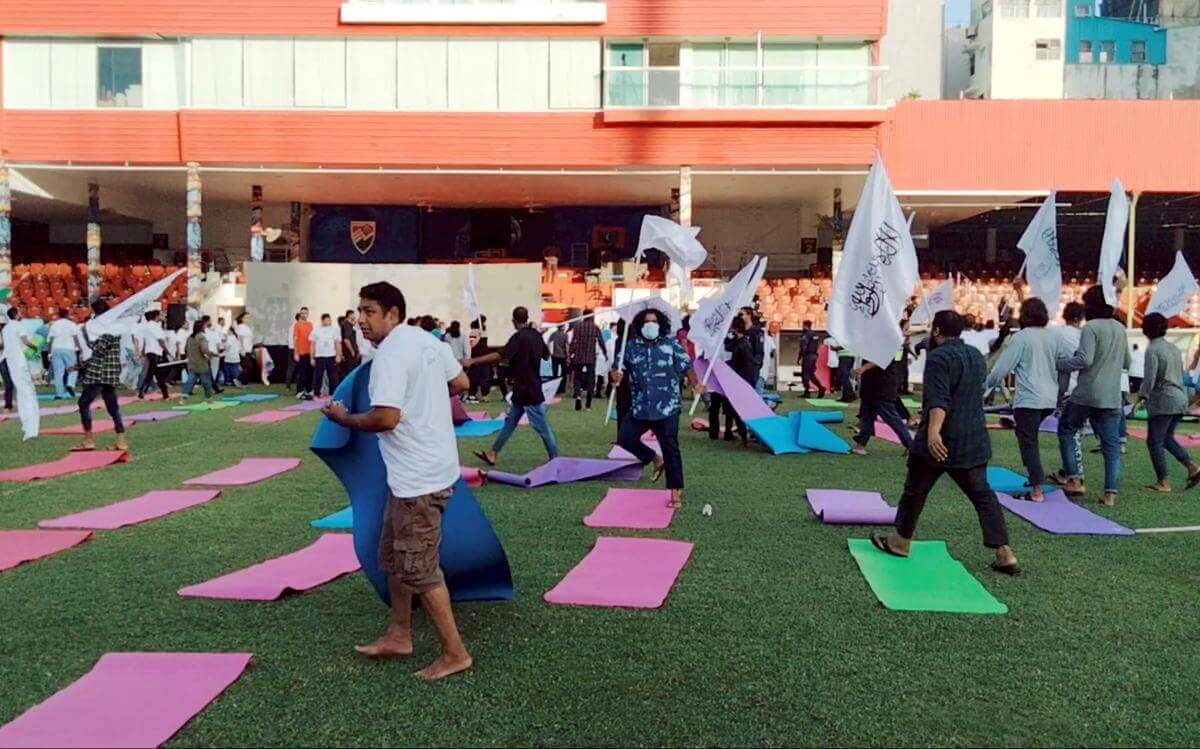The Maldives Police Service (MPS) has launched a ‘high-priority’ investigation into a mob attack by Islamic extremists on a yoga event organised by the Indian High Commission in Male on Tuesday morning. Furthermore, the Cabinet has established a subcommittee to look into the event.
A statement by the government condemned the incident “in the strongest terms,” saying, “Such malicious acts of violence aimed at disrupting public safety and undermining security of individuals and the diplomatic corps will not be tolerated.”
The MPS released a press statement announcing that its Organized Crime Department of the Crime Investigation Command is leading the investigation, noting that the “perpetrators had sought to incite fear by forcefully entering, destroying property and attempting to assault participants of the event.”
Statement by the Government of Maldives on the incident disrupting International Yoga Day event
— Ministry of Foreign Affairs 🇲🇻 (@MoFAmv) June 21, 2022
📃 Press Release | https://t.co/wqqTa0vXX6 pic.twitter.com/LuOZv7gwd0
Crucially, it laid the blame at the feet of the Islamist Progressive Party of the Maldives (PPM), saying the assailants used objects from PPM offices. These allegations were echoed by Sports Minister Ahmed Mahloof.
Superintendent Fathmath Nashwa said police cracked down on the protesters with anti-riot measures and also used pepper spray and tear gas canisters to control the crowd. Six Maldivian nationals have been arrested in connection with the violence so far.
Around 6:30 am at the National Stadium in Male, around 150 participants, including diplomats and government officials, gathered for an event hosted by the Indian High Commission that marked the 8th United Nations International Day of Yoga.
An investigation has been launched by @PoliceMv into the incident that happened this morning at Galolhu stadium.
— Ibrahim Mohamed Solih (@ibusolih) June 21, 2022
This is being treated as a matter of serious concern and those responsible will be swiftly brought before the law.
State-owned press agency Avas reported that just a few minutes later, a mob of Islamic extremists entered the stadium, following which they shouted at participants to vacate the stadium, even going as far as hitting them and throwing food at them.
In fact, even prior to the event, protesters were seen shouting slogans and carrying banners and placards proclaiming that yoga is against the tenets of Islam, which is the state religion in the Maldives. Threats were also issued on social media.
It has been speculated that the flags flown by the rioters were the same as those used in a recently-organised rally by the PPM. Refraining from acknowledging the coincidence, PPM’s Secretary-General Mohamed Tholal told the media that while the flags used by demonstrators were similar to those used by his party, it is unclear whether they were the same flags.
STATEMENT
— Progressive Party of Maldives (@ProgressPartyMV) June 21, 2022
Police attempts to apportion blame on us for this morning’s unlawful scenes at Galolhu National Stadium are politically-motivated and baseless. pic.twitter.com/lP5UiT4lMR
Moreover, the party released a statement saying that allegations of the PPM’s involvement are “politically-motivated and baseless.”
Party spokesperson Heena Waleed described the PPM as the “most responsible political party in the country,” adding that its goal is merely to “hold an increasingly heavy-handed and despotic regime to account.” It blamed the police for “failing miserably” to protect attendees, and even alleged that the police “may actually have aided and abetted in putting these people at risk, with a covert, sinister agenda of blaming the opposition coalition and our leader, former President Abdulla Yameen.”
Yameen has frequently rallied against the Solih government expanding ties with India, playing a leading role in the #IndiaOut protests, which have repeatedly taken place since 2018, when Yameen was defeated at the polls by Solih. Campaigners have hit out at India’s military presence in the country and opposed the decision to allow India to open a consulate in southern Addu, believing it will pave the way for India to expand its military presence in the country.
Dramatic visuals from Maldives as group of extremists disrupt Yoga Day celebrations organised in capital Male pic.twitter.com/es9q3y5g2o
— Sidhant Sibal (@sidhant) June 21, 2022
The latest round of hostility against India in the Maldives comes after the recent controversial comments on Prophet Muhammad by media officials from India’s ruling Bhartiya Janta Party. In fact, the Maldives government responded at the time by saying it is “deeply concerned by the derogatory remarks made by some officials of BJP,” though it added that it is pleased with the party’s response of suspending one of the officials and expelling the other.
Despite these hiccups in bilateral ties, however, India has continually sought to push the Maldives further away from the clutches of China and expand its own regional footprint. Earlier this month, the Indian government agreed to sell 520 tonnes of sugar to the Maldives under a special permit until 2024.
Similarly, in May, Maldivian Foreign Minister Abdulla Shahid said the country will import Indian wheat under a special permit, despite India announcing a wheat export ban. In fact, trade between the two countries grew by 31% last year.
Furthermore, India is the top tourist market for the Maldives, with Indian citizens accounting for 14.3% of total arrivals this year.

